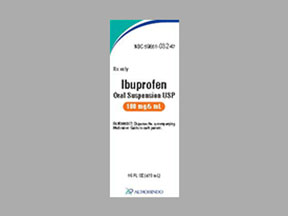
Eq Ibuprofen Childrens Coupons & Savings Card – Discount Prices from $6.93
Brand for: Ibuprofen
Ibuprofen is a medication designed to alleviate pain from various conditions, including headaches, dental pain, menstrual cramps, muscle aches, or arthritis. It also helps in reducing fever and easing minor aches and pains associated with the common cold or flu. As a nonsteroidal anti-inflammatory drug (NSAID), ibuprofen functions by inhibiting the production of certain natural substances in your body that lead to inflammation. This action reduces swelling, discomfort, and fever. For chronic conditions like arthritis, consult your doctor for advice on non-drug treatments or alternative medications. Note that this form of ibuprofen is intended for children, and it should not be administered to children under 2 years old without a doctor's guidance. Always check the product label for ingredients, as formulas may change, and products with similar names might contain different components for various uses. Using the incorrect product can cause harm.
Our Eq Ibuprofen Childrens coupons are free to use. You can print the coupon, email it to yourself, or receive the Eq Ibuprofen Childrens coupon via text message. To get your free discount, show the pharmacist your Eq Ibuprofen Childrens savings card which has the discounted coupon price. Use our filters below to edit the prescription box to match your needs. The Eq Ibuprofen Childrens prices will update based on your prescription needs. Above our Eq Ibuprofen Childrens coupons, you can change the location to see pharmacy prices in other areas. Our prescription discount card will update online with the specific pharmacy costs associated with your edits. Be sure to text, email, or print the Eq Ibuprofen Childrens savings card code that you need after editing the prescription box and location field. Show the discount card to your pharmacist before paying.
My prescription
Edit
118ML of 100MG/5ML, Ibuprofen (1 Bottle)
Select pharmacy

CVS
$21.72
COUPON PRICE
Walmart
$6.93
COUPON PRICE
Albertsons
$8.72
COUPON PRICE
Walgreens
$8.81
COUPON PRICEEq Ibuprofen Childrens savings card
Show this card to your pharmacist
Walmart
$6.93
BIN
ID
PCN
GRP
019876
LH15F2FC4F
CHIPPO
LHX
Powered by
Ibuprofen is a medication designed to alleviate pain from various conditions, including headaches, dental pain, menstrual cramps, muscle aches, or arthritis. It also helps in reducing fever and easing minor aches and pains associated with the common cold or flu. As a nonsteroidal anti-inflammatory drug (NSAID), ibuprofen functions by inhibiting the production of certain natural substances in your body that lead to inflammation. This action reduces swelling, discomfort, and fever. For chronic conditions like arthritis, consult your doctor for advice on non-drug treatments or alternative medications. Note that this form of ibuprofen is intended for children, and it should not be administered to children under 2 years old without a doctor's guidance. Always check the product label for ingredients, as formulas may change, and products with similar names might contain different components for various uses. Using the incorrect product can cause harm.
Our Eq Ibuprofen Childrens coupons are free to use. You can print the coupon, email it to yourself, or receive the Eq Ibuprofen Childrens coupon via text message. To get your free discount, show the pharmacist your Eq Ibuprofen Childrens savings card which has the discounted coupon price. Use our filters below to edit the prescription box to match your needs. The Eq Ibuprofen Childrens prices will update based on your prescription needs. Above our Eq Ibuprofen Childrens coupons, you can change the location to see pharmacy prices in other areas. Our prescription discount card will update online with the specific pharmacy costs associated with your edits. Be sure to text, email, or print the Eq Ibuprofen Childrens savings card code that you need after editing the prescription box and location field. Show the discount card to your pharmacist before paying.
More prescriptions for rheumatoid arthritis
coupons from$19.83Save 80%
coupons from$983.22Save 62%
coupons from$186.58Save 49%
coupons from$12.96Save 73%
coupons from$17.34Save 52%
coupons from$7.84Save 63%
coupons from$21.67Save 35%
coupons from$2.15Save 96%
More prescriptions for rheumatoid arthritis
Dexamethasone Intensol Save 80%coupons from $19.83
Enbrel Save 62%coupons from $983.22
Tolectin 600 Save 49%coupons from $186.58
Sulindac Save 73%coupons from $12.96
Ft Aspirin Save 52%coupons from $17.34
Aspirin Save 63%coupons from $7.84
Cortef Save 35%coupons from $21.67
Decadron Save 96%coupons from $2.15
Eq Ibuprofen Childrens (Ibuprofen) dosage forms
Use our Eq Ibuprofen Childrens (Ibuprofen) 118ML of 100MG/5ML coupon with prices from $6.93 for 1 Bottle. You can also use our Eq Ibuprofen Childrens (Ibuprofen) 118ML of 100MG/5ML coupon with prices from $11.35 for 2 Bottles. We have a Eq Ibuprofen Childrens (Ibuprofen) 118ML of 100MG/5ML coupon with prices from $15.78 for 3 Bottles. You can use our Eq Ibuprofen Childrens (Ibuprofen) 118ML of 100MG/5ML coupon with prices from $20.21 for 4 Bottles.
Dosage Quantity Price from Per unit 118ML of 100MG/5ML 1 Bottle $6.93 $6.93 118ML of 100MG/5ML 2 Bottles $11.35 $5.67 118ML of 100MG/5ML 3 Bottles $15.78 $5.26 118ML of 100MG/5ML 4 Bottles $20.21 $5.05 118ML of 100MG/5ML 5 Bottles $24.64 $4.93
| Dosage | Quantity | Price from | Per unit |
|---|---|---|---|
| 118ML of 100MG/5ML | 1 Bottle | $6.93 | $6.93 |
| 118ML of 100MG/5ML | 2 Bottles | $11.35 | $5.67 |
| 118ML of 100MG/5ML | 3 Bottles | $15.78 | $5.26 |
| 118ML of 100MG/5ML | 4 Bottles | $20.21 | $5.05 |
| 118ML of 100MG/5ML | 5 Bottles | $24.64 | $4.93 |
Eq Ibuprofen Childrens FAQs
Using the SaveHealth discount card, what is the price of Eq Ibuprofen Childrens without insurance?
Using the SaveHealth discount card, the price of Eq Ibuprofen Childrens without insurance is $6.93.
What is the price of Eq Ibuprofen Childrens at CVS?
The price of Eq Ibuprofen Childrens at CVS is $21.72.
What is the price of Eq Ibuprofen Childrens at Walgreens?
The price of Eq Ibuprofen Childrens at Walgreens is $8.81.
What is the price of Eq Ibuprofen Childrens at Walmart?
The price of Eq Ibuprofen Childrens at Walmart is $6.93.
